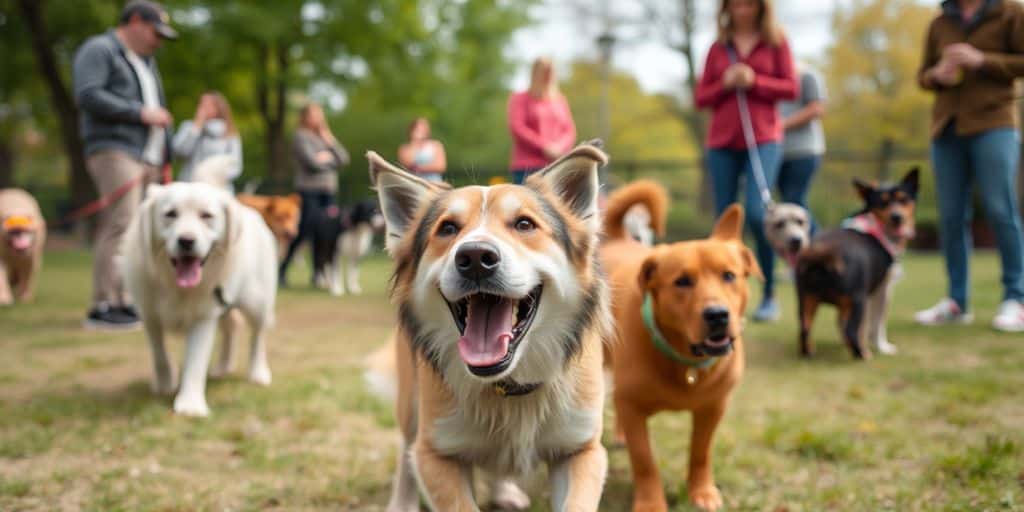Socializing your dog is essential for their happiness and well-being. Whether you have a puppy or an adult dog, proper socialization helps them feel comfortable in different situations, interact well with other dogs and people, and reduce anxiety. This article provides effective tips and strategies to help you socialize your dog successfully.
Key Takeaways
- Start socializing your dog early to make the process easier and more effective.
- Use positive reinforcement techniques to encourage good behavior during socialization.
- Gradually introduce your dog to new environments and experiences to build their confidence.
- Monitor your dog's progress and adjust your strategies as needed.
- Seek professional help if you encounter significant challenges or behavioral issues.
Understanding the Importance of Dog Socialization
Why Socialization Matters
Socializing your dog is crucial for their overall well-being. It helps them react to the world in a healthy way, without fear or aggression. Dogs that aren't socialized can become fearful in new situations, like meeting new people or being around other pets. Socialized dogs are typically easier to train, less likely to develop behavioral issues, and more adaptable to changes in their environment.
Benefits for Your Dog
Socializing your dog comes with numerous benefits:
- Increased Confidence: Well-socialized dogs have less fear and anxiety and are more adaptable to new environments.
- Better Behavior: Socializing your dog improves their behavior, making them less aggressive towards people or other dogs.
- Improved Health: Socializing your dog reduces stress levels and boosts their immune system.
- Increased Safety: A well-socialized dog is less likely to become aggressive, reducing the risk of bites or other injuries.
- Enjoyable Outings: A well-socialized dog is usually well-behaved in public settings, making outings more enjoyable for both the dog and the owner.
Long-Term Impact on Behavior
Proper socialization has a long-term impact on your dog's behavior. Dogs that are regularly exposed to new people, animals, and environments are far less likely to develop aggressive behaviors. They are also more likely to handle vet exams and grooming sessions with ease. In the long run, socialized dogs lead happier, healthier lives and are more pleasant companions.
Remember, socialization is an ongoing process. Continuously exposing your dog to new experiences will help maintain their social skills and ensure they remain well-adjusted.
Starting Early: Socializing Your Puppy
Key Socialization Periods
The first few months of a puppy's life are crucial for socialization. During this time, they are more open to new experiences and less likely to be fearful. The ideal window for socialization is between 3 and 14 weeks of age. During this period, expose your puppy to a variety of people, places, and situations to help them become well-adjusted adults.
Introducing New Experiences
To a puppy, the world is full of new sights, sounds, and smells. Introduce them to different environments gradually. Take them for car rides, let them walk on various surfaces like grass, concrete, and sand, and expose them to household noises like the vacuum cleaner or the doorbell. The goal is to make these experiences positive and non-threatening.
Positive Reinforcement Techniques
Using positive reinforcement is key to successful socialization. Reward your puppy with treats, praise, or playtime whenever they respond well to new experiences. This helps them associate new situations with positive outcomes. Consistency is important, so make sure everyone in the household follows the same approach.
Remember, socializing your puppy early sets the foundation for a confident and well-behaved dog. Take it one step at a time and enjoy the journey together!
Socializing Adult Dogs: Overcoming Challenges
Common Issues with Adult Dogs
Socializing an adult dog can be tricky because they often have established behaviors and may be more cautious about new experiences. Some common issues include:
- Fear or aggression around people or other animals
- Nervousness during walks
- Shyness or overexcitement
If your dog shows any of these behaviors, it's time to start socializing! While the process might seem intimidating, it will ultimately be a rewarding bonding experience for you and your fur child.
Gradual Exposure to New Environments
Start by taking your dog for walks to help them take in the sights, smells, and sounds of the neighborhood. This is a great way to introduce them to new environments without overwhelming them. If you encounter a stressful situation, simply turn around and go home. Remember, patience and consistency are key!
Next, you might start facilitating meetings with friendly dogs you know. Walks side by side can be a good way to let dogs interact without putting too much pressure on. Your dog can graduate to closely supervised playdates and off-leash interactions.
Building Confidence Through Training
Basic obedience training is the foundation for a well-behaved dog. Teaching your dog commands like sit, wait, and come not only makes life easier but also helps them feel more secure in new situations. By using positive reinforcement, you can help your dog build confidence and adaptability.
Celebrate the small victories – maybe today they growled less at a stranger, or took a treat gently without snapping. These moments are huge in the world of dog training.
If your dog is showing signs of reactivity, anxiety, aggression, or other worrisome behaviors, reach out to a certified professional trainer who uses positive reinforcement techniques to help you build a plan unique to your dog.
Effective Techniques for Dog Socialization
Controlled Introductions to Other Dogs
One of the best ways to socialize your dog is through controlled introductions to other dogs. Start by making seeing other dogs a positive experience. Offer a treat when you see another dog in the distance. Gradually decrease the distance over time, ensuring your dog remains comfortable and calm. This method helps your dog associate other dogs with positive outcomes.
Using Treats and Rewards
Positive reinforcement is key to effective socialization. Reward your dog for good behavior, such as sitting calmly when meeting new people or dogs. Treats, praise, and playtime are excellent rewards. This approach encourages your dog to repeat the desired behavior, making socialization a positive experience for them.
Incorporating Play and Exercise
Play and exercise are essential for socializing your dog. Regular playtime with other dogs helps them learn social cues and build confidence. Activities like fetch, tug-of-war, and agility courses are great for this. Not only does this provide physical exercise, but it also offers mental stimulation, making your dog more adaptable in social situations.
Remember, socialization is an ongoing process. Be patient and consistent, and your dog will become more comfortable and confident in various social settings.
Socialization in Different Settings
Dog Parks and Public Spaces
Dog parks and public spaces are great places for your dog to meet other dogs and people. Proper socialization helps prevent behavioral issues and ensures your dog feels comfortable and confident in various situations. Start with short visits and gradually increase the time spent there. Always supervise your dog to ensure safe interactions.
Visits to Friends and Family
Introducing your dog to friends and family can help them get used to different people and environments. Make sure these visits are positive experiences by bringing along their favorite toys or treats. Encourage gentle interactions and reward your dog for calm behavior.
Handling Crowded or Busy Areas
Busy areas can be overwhelming for some dogs. Gradual exposure is key. Start with less crowded places and slowly work your way up to busier environments. Use positive reinforcement to reward your dog for staying calm. This will help build their confidence and make them more adaptable to different settings.
Remember, every dog is different. Be patient and adjust your approach based on your dog's comfort level.
Monitoring Progress and Adjusting Strategies
Recognizing Signs of Improvement
It's important to keep an eye on your dog's progress. Look for small victories, like being more relaxed around new dogs or not barking at strangers. Celebrate these wins to keep both you and your dog motivated.
Adjusting Techniques as Needed
If something isn't working, don't be afraid to switch things up. Maybe try a different type of treat or a new training method. The key is to be flexible and patient.
When to Seek Professional Help
Sometimes, despite your best efforts, you might need a little extra help. If your dog is still showing signs of stress or aggression, it might be time to consult a professional trainer. They can offer personalized advice and strategies to help your dog become more comfortable in social situations.
Remember, every dog is different. What works for one might not work for another. The goal is to find what makes your dog happy and confident.
Conclusion
Socializing your dog is a journey that brings countless rewards. By taking the time to expose your furry friend to new experiences, people, and other dogs, you are setting them up for a happier and more confident life. Remember, patience and consistency are key. Celebrate the small victories and keep the experiences positive. With these tips, you'll be well on your way to raising a well-adjusted and joyful pet. Happy socializing!
Frequently Asked Questions
Why is socializing my dog important?
Socializing your dog helps them become comfortable in different situations, reduces anxiety, and prevents behavior problems like aggression.
When should I start socializing my puppy?
The best time to start socializing your puppy is between 3 to 14 weeks old. This is when they are most open to new experiences.
Can adult dogs be socialized?
Yes, adult dogs can be socialized, although it might take more time and patience. Gradual exposure and positive reinforcement are key.
What are some common challenges when socializing a dog?
Common challenges include fear, anxiety, and aggression. It's important to go slow and use positive reinforcement to help your dog feel safe.
How can I tell if my dog is making progress with socialization?
Signs of progress include your dog being more relaxed in new situations, interacting positively with other dogs and people, and showing less fear or aggression.
When should I seek professional help for socializing my dog?
If your dog shows signs of severe fear, aggression, or anxiety that you can't manage on your own, it may be time to seek help from a professional dog trainer or behaviorist.


